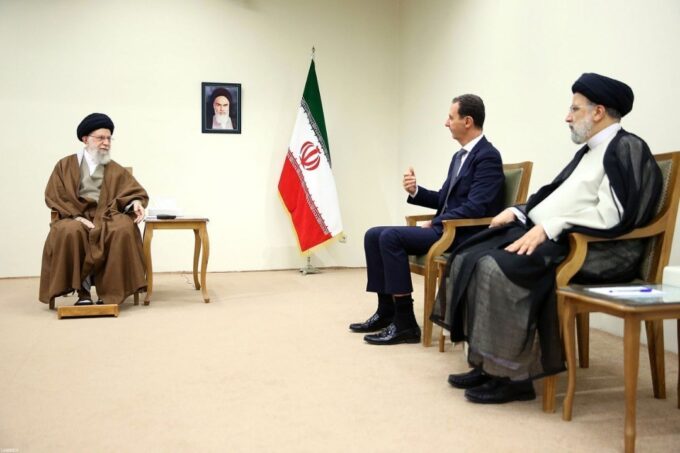
From Tehran to Damascus, the Gordian Knot
Marah Bukai
Editor’s Message
One of the marvels of this time is that an “Iranian” peace mediator travels between capitals to prevent a possible confrontation between two parties, the first one is Turkish, and the second the Syrian regime. Ankara is supposed to start its military operations to secure a buffer zone that protects it from Kurdish fighters on its long border strip with northern Syria, a distance of 30 km incursion into Syrian lands and cities.
The peace mediator coming to the capital, Damascus, for the same reason he visited the capital, Ankara, yesterday, is the Iranian Foreign Minister, Amir Abdollahian. Before leaving for Syria, he said, “My trip to Syria revolves especially around peace and security in the area between Syria and Turkey.” Turkish President Recep Tayyip Erdogan has repeatedly threatened – before and after the NATO summit – to carry out a new military operation in two areas in northern Syria, “Tal Rifaat” and “Manbij,” to target Kurdish fighters he describes as “terrorists.”
The mediator holds the identity of a government sponsoring the terrorism of the Iranian revolutionary guard, which is on the international and US terrorist lists. The contradiction in the character of this surreal news is not limited to the fact that the mediator is the head of the diplomacy of the cross-border sectarian militias that have wreaked death, corruption, destruction, and racist mobilization in Syria, Lebanon, Iraq, and Yemen. This contradiction extends the possibility of coups in the current alliances on the ground since the entry of Iranian militias to suppress the peaceful Syrian rebel movement that began in 2011 until the date of this writing.
The future Iranian ally of the Syrian regime, with the two Assad’s – father and son – intertwined fatefully with him with an ideological network that is difficult to break. He declares through his foreign minister before leaving Ankara for Damascus that his government “‘understands’ the need for a new Turkish military operation against the Kurdish fighters in Syria”!
Here, I wonder: Did Abdullahian arrive in Syria to pressure the Assad regime to turn a blind eye to the Turkish operation? And to allow Erdogan to bite more Syrian land after the latest return from the NATO summit with the tacit support of the alliance members to move forward with his operation? Or does Iran have the upper hand in the palace of immigrants, surpassing the absolute Russian authority? Will Iran Seize the opportunity of Moscow’s complete preoccupation with its war on Ukraine to thrust on what remains of the Syrian “sovereign” decision, tipping the scales, shifting the charades of alliances to satisfy Turkey on the one hand, and sending a clear message to Washington that it can negotiate at the peace table whenever it deems necessary?
The United States, for its part, reiterated its warning to Ankara of the consequences of a possible attack on northern Syria. Foresaw the upcoming Turkish operation as a clear threat to stability and endangering its war, in cooperation with its allies in the Syrian Kurdish Forces (SDF), against terrorist organizations such as ISIS and its associates.
Tehran and Ankara share the hostility of the Kurdish PKK organization, which has been carrying out military operations in Iran and Turkey for decades. However, at the same time, Iran claims to defend Syria’s territorial integrity and the Assad state’s sovereignty. So has magic turned against the magician in the immigrant palace, and the Turkish safe zone will be the major blow that Tehran directs to the Damascus regime? Will it become a heavy burden, Politically and financially, after it has exhausted all its needs from it and after its expiration date?
I wonder!
Translated/Edited by Abdelrahman Elnaggar
